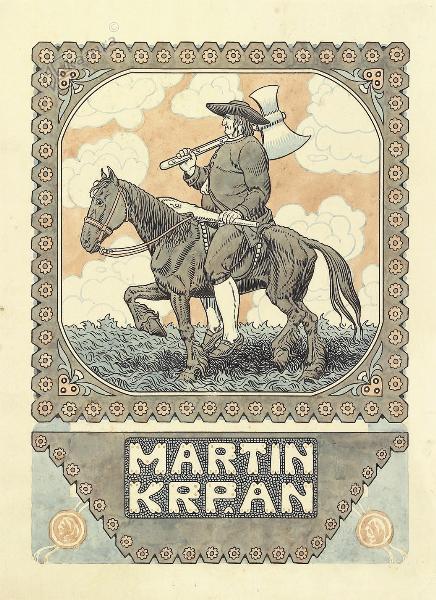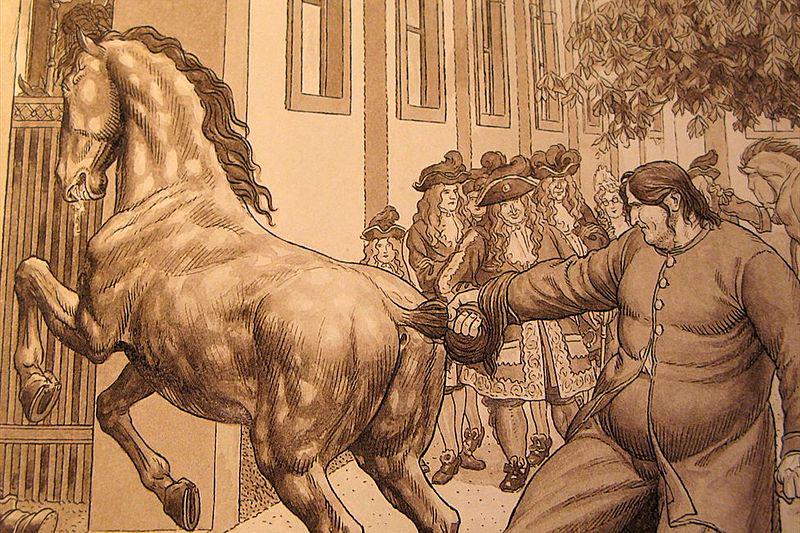
Fran Levstik was a Slovenian poet, playwright, literary critic, journalist and pioneer of the Young Slovene political movement. With his literary works entitled Popotovanje iz Litije do Čateža (A Journey from Litija to Čatež) (1858), Napake slovenskega pisanja (Mistakes in Slovene Writing) and other critical essays, he formulated a literary programme that in the 19th century provided a basis for Slovenian literary creation. To set an example for his literary principles and guidelines for prose writing, Levstik wrote a story of Martin Krpan z Vrha (Martin Krpan from Vrh). He was born in 1831 in Dolnje Retje near Velike Lašče.

Although the story initially received a poor response, decades later Martin Krpan became a hero of almost mythical proportions with a significant influence on the development of national awareness.
Even today, Martin Krpan is closely associated with the national affiliation. The middle of the 19th century thus witnessed the birth of Martin Krpan, a character who has become a fundamental and timeless Slovenian superhero, deeply rooted in the cultural awareness of every Slovenian.
The story of Martin Krpan
Let’s start from the beginning. Who is Martin Krpan? Well, he’s a very well known character to all Slovenians but maybe completely unknown to the foreign reader. Levstik’s Krpan is a stalwart, a simple but unique countryman from the village of "Hilltop by the Holy Trinity", who made his living by smuggling English salt. Because of his actions, he ran into many problems with the authorities. One day, Krpan accidentally meets the imperial carriage and makes way for it by simply lifting up his mare and moving her aside. The Emperor was thus taken aback by Martin Krpan’s strength. A year later, the Emperor summoned Krpan to the royal Viennese court, as Vienna was being terrified by Brdavs, a brutal warrior who ruthlessly murdered everyone who came his way. Simple but clever, not at all conceited, such as he was, Krpan easily defeated Brdavs. He did his job. Now he only had to provide himself with a permit for carrying on with the transportation of salt and head home with his mare. Martin Krpan is a simple smuggler of salt, with a sober and clear mind, who in a tactful but his own unique way rescues the Emperor and Vienna from the giant Brdavs. For his work, Krpan was not amply repaid; instead, he faced ingratitude and ridicule, but he dealt with this in his own distinctive way. In terms of national awakening, this is an essential aspect of Levstik’s story, which was of major importance, also influencing the awakening of Slovenian national awareness. To make the story more powerful, Levstik put it in the mouth of an old farmer and so added the simple colourful narration of a story-teller, thus bringing it even closer to the people.
Ever since its birth and publication, Levstik's story has roused Slovenian readers and literary critics alike. It has made a truly remarkable impact. As noted by literary historian and researcher of Slovenian literature Anton Slodnjak, with his tale of Martin Krpan Fran Levstik wanted to create an artistic model for theoretical debate, since Martin Krpan is a culmination of the folklore narrative mode. In Slodnjak’s opinion, Levstik’s aim was to implement his literary programme and show what type of prose should be written for Slovenians.
A hero and a smuggler
The story of Martin Krpan is a Slovenian story about the fight between a simple and little man and a giant. Martin Krpan is a man of the people, who on account of his physical strength and lightness of heart becomes a real and authentic Slovenian superhero. It was not until the end of the 19th century, however, that the reaction to the story became more visible. And Krpan’s popularity really began to rise only in the twentieth century. Publishers issued the story in a variety of forms – from picture books for children and adults to various collections and editions. Bojan Baskar (ethnologist, 2008) wrote that a real explosion of Krpan’s popularity occurred in the period before Slovenia’s independence. The image of Krpan embodying the Slovenian national character then spread from academic circles to the general public.
Thus, in our consciousness, Martin Krpan is perceived as more than just a simple man with extraordinary strength. He is one of those heroes of Slovenian literature who are distinguished by courage, dignity and modesty and who have been entirely internalised by Slovenians. There are many folk stories associated with Krpan’s paths and strength. In folk tradition, we can still find stories about the whereabouts of his homestead at the Hilltop by the Holy Trinity near Pivka and Postojna, and this is just on the road that led to Trieste and on which the traffic in salt was most busy.
National derivations
Today we can find a wide variety of offshoots – Martin Krpan lent his name to numerous products and institutions, including competitions for the strongest Slovene. The Sečovlje Saltpans also marketed its brand and story of salt on the image of Martin Krpan. Where it smells of power, there’s Martin Krpan!
It is also interesting to note that prior to Slovenia’s accession to the European Union, even various debates were held, mainly political ones, in which Vienna was compared to Brussels. The character of Martin Krpan is also attractive in terms of national awareness. Krpan is a hero raising national awareness and affiliation. Also its author, Fran Levstik, was a fervent patriot and a great Slovenian, politician and linguist. To the very end, he remained true to his words, which he wrote in his play entitled Tugomer: "Be tough and merciless, a man of steel, when defending the honor and justice of the nation and of its language! (Trd bodi in neizprosen, mož jeklen, kadar je braniti časti in pravde narodu in jeziku svojemu!)".
Historical background of salt smuggling
The interpretations of Krpan’s salt smuggling are particularly interesting. In the period of Martin Krpan, Austria did not permit any buying and selling of salt, nor did it abolish the monopoly of domestic salt originating from Trieste until as late as 1819, when free trade was introduced. This led to a widespread smuggling of salt, and Levstik’s idea for the story of Martin Krpan came from such smugglers. This is one interpretation. Another interpretation suggests that Krpan peddled English salt or saltpetre, which was used for making explosives.
Krpan today
Today Martin Krpan has become topical in light of the difficult situation in which Slovenia has found itself and the strength that our country has to show to overcome this situation. Levstik’s Krpan is thus exactly what we need – resilience, agility, resourcefulness and determination. Precisely because Martin Krpan is a simple man, his character is an even stronger inspiration to the nation and its power. In this respect, the parallels between a simple literary hero and his political dimension are of significant relevance.
Martin Krpan on Stage
In art, Martin Krpan is currently a very significant figure, also because the story is being staged at the Slovene National Theatre Drama (SNT Drama) in Ljubljana. Starting this month, SNT Drama will present the most updated theatre performance of Martin Krpan. With this performance, it seeks to bring the story of Martin Krpan closer to younger generations by introducing a video animation. The performance is aimed at children from 4 to 14 years as well as the older audience – the play is timeless and can thus be enjoyed by everyone, regardless of age. The voice of Martin Krpan is performed by actor Jernej Šugman. In creating the play, director Janez Burger explored the idea of how to bring Krpan and the play closer to "the children growing up in an overabundance of audio-visual sensations – from the TV and cinema to the internet and video games and other applications in smart phones – while not losing the most important feature of the play – the magic of narrating a story about a primary Slovenian superhero." The basic feature of the performance is a narrator who is telling Levstik’s story about Martin Krpan with recorded dialogues of all the characters that appear therein. Using animations and other audio-visual sensations, the narrator’s story spreads across the stage and in the interaction with the narrator forms a compact world of contemporary audio-visual narration: "In this way, we wanted to create a warm and amusing performance to bring the story of our hero from the 19th century to the children from the 21st century," Janez Burger explains.
Polona Prešeren, SINFO
Fran Levstik was a Slovenian poet, playwright, literary critic, journalist and pioneer of the Young Slovene political movement. With his literary works entitled Popotovanje iz Litije do Čateža (A Journey from Litija to Čatež) (1858), Napake slovenskega pisanja (Mistakes in Slovene Writing) and other critical essays, he formulated a literary programme that in the 19th century provided a basis for Slovenian literary creation. To set an example for his literary principles and guidelines for prose writing, Levstik wrote a story of Martin Krpan z Vrha (Martin Krpan from Vrh). He was born in 1831 in Dolnje Retje near Velike Lašče.


































































